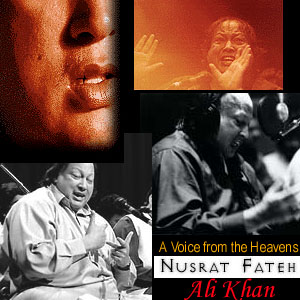

Music
Sans Frontiers
The Glory of the ‘Velvet Fire’
by Vishal Oberoi
A
pious mystic called upon the Ali Khan home in Lyallpur (erstwhile Faislabad),
Pakistan, on a summer evening in the early ‘50s. Three-year old Pervez caught
his attention and, as if narrating a prophecy, he instructed that the lad’s
name be changed to something more apposite, because he was to scale great
heights in future. Perhaps it was a premonition to indicate that this boy would
go on to enthrall the world, captivate audiences with his prodigious musical
talent, and, purely with his enchanting voice, infuse the fervent emotions of
wholesome ecstasy into the souls of millions. He was aptly re-christened Nusrat
(bliss).
Any
effort to eulogize Ustad Nusrat Fateh Ali Khan is analogous to holding a modest
candle to the flaming sun. Perhaps Jeff Buckley’s attempt was the most
appropriate, when he said, “his voice
is a velvet fire, simply incomparable”. His performance on the soundtrack of
“Dead Man Walking” (1995), alongside Eddie Vedder, lead singer of Pearl Jam,
brought about a cyclonic wave of curiosity and acclamation, and began a
revolution of sorts. At the pinnacle of his glory, Nusrat had mesmerized
audiences ranging from London’s Royal Albert Hall to New York’s Central
Park, taking them all on a dream-like voyage into the ambit of a 7-century old
Sufi tradition called Qawwali. His songs can be heard from the Islamic shrines
of Asia, to the not-so-hallowed nightclubs of Europe.
However, back home, his efforts to take Qawwali to the West were
condemned, and considered to be a corruption of its sacred identity. But Nusrat
was confident of the global nature and appeal of his music, and he
wholeheartedly believed that the integral message of tranquility was required to
reach out to everyone. He felt that if the propagation of this message entailed
the fusion of the spiritual compositions of Sufism with the sounds of the West,
then it was not a corruption, but merely a translation into a language with a
larger wingspan. His collaborations with artists as diverse as Peter Gabriel,
Tim Robbins, Michael Brook, A.R.Rehman and Massive Attack, altogether composed
an unforgettable tale of triumph and achievement, which left the world,
spellbound, and his critics at home, speechless.
Appreciation
grew exponentially, as his fame spread amongst aficionados, musicians, and even
the tattooed, body-piercing ‘GeneratioNext’-ers, who still think his
‘stuff’ is ‘groovy’. His concerts around the world drew scores of
listeners, some of who couldn’t even understand a word of what he sang. They
came to hear his vocal pirouettes coupled with ethno-percussion, and feel the
rich, authentic texture of his music. They came to be a part of the spirited
(yet meditative) trance which he launched himself into, and to watch his
vigorous hand movements which seemed to pilot his wide-ranging intonations into
the atmosphere. They came simply because they were passionately in love with the
way he sang, because he sang the only way he knew how to – from the depths of
his heart.
In
the midst of critical tensions across the borders of the sub-continent, Nusrat
spoke of brotherhood and unity. Although his music was a bridge of cultural
harmony, which broke barriers of creed and language, his died an untimely death
and his vision of an anticipated concord between India and Pakistan remained
unrealized.
The
dusk of 16th August 1997 stole this musical genius from us, leaving
behind embryonic plans to work with the likes of Madonna, Luciano Pavarotti and
Ravi Shankar. The extent of the man’s devotion to his mission was clearly
evident when doctors claimed that he put his work ahead of his health, and went
on with his whirlwind tour, even though he knew he was ill. In his eternal
absence, his nephew and chosen heir, Rahat Fateh Ali Khan, promises to keep the
flame alight. With packed performances in the U.S. and Europe, Rahat’s
exceptional talent has already won him acclaim as the rightful successor to his
‘Ustad’.
An exponent of music. An ambassador of amity. A messiah of hope. A messenger of peace. However we remember him, Ustad Nusrat Fateh Ali Khan was an unforgettable legend. In our spirits, in our homes, and even in war-struck parts of our globe, his voice will echo on as a symbol of eternal faith, till the sense of sound subsists.